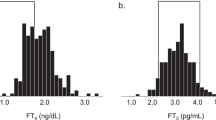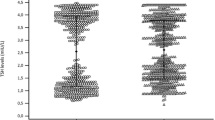Abstract
Introduction
Persistent elevation of thyroid-stimulating hormone (TSH) is common in endocrinology practice in patients undergoing replacement or suppression therapy with levothyroxine sodium (LT4). After examining the causes of this condition, LT4 absorption test is recommended. In this report, we wanted to share our results of LT4 absorption test in patients with elevated TSH levels.
Materials–methods
The files of patients who presented to our clinic between 2015 and 2018, whose TSH elevation continued despite high-dose LT4 therapy, and who underwent absorption test were reviewed retrospectively.
Results
Levothyroxine sodium absorption test was applied to five patients. Absorption test revealed LT4 malabsorption in two patients and pseudomalabsorption in the other three patients.
Discussion
When all published pseudomalabsorption cases were considered, it has been stated that at least 2.5 times increase in basal fT4 level may exclude malabsorption. The formula we used has been implemented by Cleveland Clinic since 2014.
Conclusion
In cases where TSH normalization is not achieved despite high doses of LT4 therapy, LT4 absorption test is an easy test for administration and interpretation and prevents unnecessary medical treatments and examinations.

Similar content being viewed by others
References
J. Jonklaas, A.C. Bianco, A.J. Bauer, K.D. Burman, A.R. Cappola, F.S. Celi, D.S. Cooper, B.W. Kim, R.P. Peeters, M.S. Rosenthal, A.M. Sawka, Guidelines for the treatment of hypothyroidism: prepared by the American Thyroid Association Task Force on Thyroid Hormone Replacement. Thyroid 24(12), 1670–1751 (2014). https://doi.org/10.1089/thy.2014.0028
S.K. Grebe, R.R. Cooke, H.C. Ford et al. Treatment of hypothyroidism with once weekly thyroxine. J. Clin. Endocrinol. Metab. 82(3), 870–875 (1997)
Y. Kashiwagura, S. Uchida, S. Tanaka et al. Clinical efficacy and pharmacokinetics of levothyroxine suppository in patients with hypothyroidism. Biol. Pharm. Bull. 37(4), 666–670 (2014)
C. Cappelli, I. Pirola, L. Daffini et al. A double-blind placebo-controlled trial of liquid thyroxine ingested at breakfast: results of the TICO Study. Thyroid 26(2), 197–202 (2016). https://doi.org/10.1089/thy.2015.0422
D. Brancato, A. Scorsone, G. Saura et al. Comparison of TSH levels with liquid formulation versus tablet formulations of levothyroxine in the treatment of adult hypothyroidism. Endocr. Pract. 20(7), 657–662 (2014). https://doi.org/10.4158/EP13418.OR
L. Anderson, F. Joseph, N. Goenka, V. Patel, Isolated thyroxine malabsorption treated with intramuscular thyroxine injections. Am. J. Med. Sci. 337(2), 150–152 (2009). https://doi.org/10.1097/MAJ.0b013e31817ee556
M.T. Hays, Parenteral thyroxine administration. Thyroid 17(2), 127–129 (2007)
C. Virili, A. Antonelli, M.G. Santaguida, S. Benvenga, M. Centanni, Gastrointestinel malabsorption of thyroxine. Endocr. Rev. (2018). https://doi.org/10.1210/er.2018-00168
E. Lahner, C. Virili, M.G. Santaguida, B. Annibale, M. Centanni, Helicobacter pylori infection and drugs malabsorption. World J. Gastroenterol. 20(30), 10331–10337 (2014). https://doi.org/10.3748/wjg.v20.i30.10331
M. Cellini, M.G. Santaguida, C. Virili, S. Capriello, N. Brusca, L. Gargano, M.Centanni, Hashimoto’s thyroiditis and autoimmune gastritis. Front Endocrinol. (Lausanne). 8, 92 (2017). https://doi.org/10.3389/fendo.2017.00092
M. Ruchala, E. Szczepanek-Parulska, A. Zybek, The influence of lactose intolerance and other gastro-intestinal tract disorders on L-thyroxine absorption. Endokrynol. Pol. 63(4), 318–323 (2012)
G.E. Sun, K.M. Pantalone, C. Faiman, M. Gupta, L. Olansky, B. Hatipoglu, The clinical utility of free thyroxine in oral levothyroxine absorption testing. Endocr. Pract. 20(9), 925–929 (2014)
G.M. Rdzak, L.M. Whitman, S.E. Inzucchi, Levothyroxine pseudo-malabsorption: testing and treatment in the outpatient setting. Ther. Adv. Endocrinol. Metab. 9(7), 217–222 (2018). https://doi.org/10.1177/2042018818771433
E. Livadariu, H. Valdes-Socin, M.C. Burlacu, C. Vulpoi, A.F. Daly, A. Beckers, Pseudomalabsorption of the thyroid hormones: case report and review of the literatüre. Ann. Endocrinol. (Paris) 68(6), 460–463 (2007)
M.T. Hays, Thyroid hormone and the gut. Endocr. Res. 14(2-3), 203–224 (1988)
M.T. Hays, Localization of human thyroxine absorption. Thyroid 1(3), 241–248 (1991)
K.B. Ain, S. Refetoff, H.G. Fein, B.D. Weintraub, Pseudomalabsorption of levothyroxine. JAMA 266(15), 2118–2120 (1991)
D.J. Lips, M.T. van Reisen, V. Voigt, W. Venekamp, Diagnosis and treatment of levothyroxine pseudomalabsorption. Neth. J. Med. 62(4), 114–118 (2004)
R.G. Symons, L.J. Murphy, Acute changes in thyroid function tests following ingestion of thyroxine. Clin. Endocrinol. (Oxf.). 19(4), 539–546 (1983)
R.M.V. Soares, R.M. de Figueiredo, M.M.N. Dantas et al. Rapid levothyroxine (Lt4) absorption test for diagnosis of Lt4 pseudomalabsorption: case report and proposal of a cutoff point. J. Endocrinol. Diabetes Obes. 4(1), 1083 (2016)
Author contributions
I.Y.S. and U.E.S. wrote the manuscript. I.Y.S. and A.G.O. reviewed/edited the manuscript.
Author information
Authors and Affiliations
Corresponding author
Ethics declarations
Conflict of interest
The authors declare that they have no conflict of interest.
Ethics statement
All procedures performed in studies involving human participants were in accordance with the ethical standards of the institutional and/or national research committee and with the 1964 Helsinki declaration and its later amendments or comparable ethical standards.
Additional information
Publisher’s note: Springer Nature remains neutral with regard to jurisdictional claims in published maps and institutional affiliations.
Rights and permissions
About this article
Cite this article
Yildirim Simsir, I., Soyaltin, U.E. & Ozgen, A.G. Levothyroxine absorption test results in patients with TSH elevation resistant to treatment. Endocrine 64, 118–121 (2019). https://doi.org/10.1007/s12020-019-01889-x
Received:
Accepted:
Published:
Issue Date:
DOI: https://doi.org/10.1007/s12020-019-01889-x




